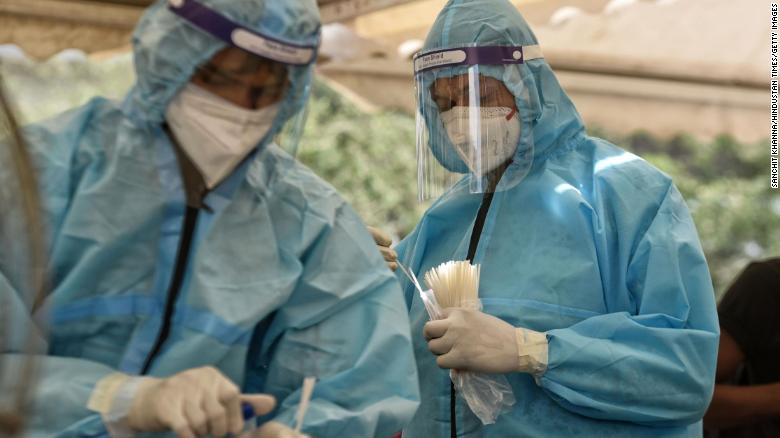
New Delhi – India has been gripped by a life or death race against Covid-19, as the country of nearly 1.4 billion people rolls out one of the fastest vaccination drives in the world while recording all-time high tallies of infections.
The country reported a record-high daily total of almost 153,000 coronavirus cases Sunday with 839 new deaths, according to health ministry figures. India’s total caseload stands at more than 13.5 million — second only to the United States and Brazil — including nearly 170,000 fatalities.
On the same day, vaccinations topped 100 million, with India being the fastest country globally to reach that milestone, reaching the figure in just 85 days, said the health ministry.
The union territory of Delhi, of which capital city New Delhi is a part, has been hard-hit by the new wave of the pandemic. Delhi Chief Minister Arvind Kejriwa announced a record single-day case rise on Sunday, of more than 10,000 new infections.
“Delhi is witnessing the fourth wave of coronavirus pandemic” warned Kejriwal. “The situation is worrisome, the government is working to improve it.”
At least 57 doctors in New Delhi tested positive for Covid-19 this week.
Some 37 doctors working at Sir Ganga Ram Hospital in the city tested positive — after previously receiving both doses of the vaccine. The doctors have mild symptoms but 32 are under home isolation, while five were admitted to the hospital to avoid the risk of infecting their families, a hospital spokesperson told CNN.
Hospital authorities are investigating the source of their infection, discovered Thursday, and further contact tracing is underway, the official added.
New Delhi’s All India Institute of Medical Sciences (AIIMS) confirmed Friday that at least 20 doctors had been found to be infected with Covid-19. Two resident doctors who tested positive had received both doses of the coronavirus vaccine, AIIMS told CNN. All the infected people have mild symptoms and are in home isolation, officials said.
The western state of Maharashtra is also a major concern. Eight of the top 10 worst-affected districts across India are in Maharashtra, including its capital Mumbai, officials said last week. Public spaces such as parks, shopping malls, cinemas and religious centers are closed in the state until further notice, and all restaurants can only serve take-out.
Thousands of migrant workers attempted to leave large cities such as Mumbai last year after lockdowns left them without jobs or pay, and locals fear a repeat of this scenario.
“Some sectors are of course more affected, which might lead to a migration of workers,” Hariharan Kumar, a lawyer in Mumbai, told CNN Sunday. “They fear losing their jobs and wages.”
“People are becoming fatigued to an extent, but I think others also realize that this is the best-case scenario,” he added.
Prime Minister Narendra Modi on Thursday announced a four-day vaccination drive starting Sunday.
India is now regularly administering over 3 million vaccines a day, surpassing the United States’ daily rollout and gaining on China’s, according to University of Oxford research group Our World in Data.
Gaurav Preet Singh, 28, got his first dose of the AstraZeneca vaccine made by the Serum Institute of India in Ludhiana in Punjab, a state in northern India. The businessman told CNN that he felt “safe” now after experiencing some side effects like a fever and fatigue.
“It’s going well and many people seem to be taking it,” Singh said.
“It’s totally safe and it’s totally good — I can get back to normal life.”
However states such as Maharashtra, Odisha and Punjab have complained of vaccine shortages, and several districts in Maharashtra have had to suspend inoculation drives, the state’s health minister said Thursday.
Singh said that in his area doctors had stopped giving the vaccines to those under 45 because of shortages.
There are lax restrictions in Ludhiana, he said, with curfews at 9 p.m. local time, but shops and hospitality remain open. Many people he knows who aren’t vaccinated are getting the virus, he added.
According to a senior administrative official in Mumbai, more than 70 centers in the city have said they do not have vaccines available. The central government has said it is doing everything it can to help the states, according to statement from the health minister earlier this week.
The Serum Institute of India, the world’s biggest vaccine maker, is producing Covid-19 vaccines for countries participating in the global vaccine-sharing initiative COVAX, but deliveries will be delayed in April as India battles the new wave of infections.
Raghav Chadha, national spokesperson for the Aam Aadmi Party, wrote to Modi Saturday asking he adopt a policy of “vaccine nationalism”
“Do not let vaccination centre [sic] shut while doses are being flown out of the country,” he said.
On Saturday, Kejriwal announced a slew of new restrictions in Delhi to fight the coronavirus spike there.
This includes a ban on all gatherings (social, political or religious), a cap on attendance at weddings and funerals at 50 and 20 people respectively, and restaurants, movie theaters and public transport must operate at half occupancy.
Delhi authorities announced Friday that all educational institutions will remain closed until further notice.
The rise in cases comes as India’s top researchers announced last month that there are nearly 800 variants of concern present in the country.
As reported by CNN
